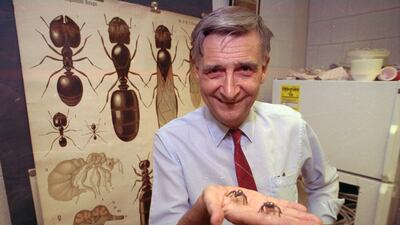Edward O Wilson, the trailblazing US scientist, professor and author whose study of insects and clarion call to protect Earth earned him the nickname “Darwin's natural heir”, has died at age 92.
Wilson, whose death was announced on Monday by his foundation, was an award-winning biologist and long-time Harvard University research professor, considered the world's leading authority on ants and their behaviour.
While an entomologist early in his career, he broadened his scope immensely, studying not only insects but the social interactions of birds, mammals and humans. He effectively — and controversially — established a new field of science known as sociobiology.
He was the author of hundreds of scientific papers and more than 30 books, two of which won him Pulitzer Prizes for nonfiction: 1978's On Human Nature and The Ants in 1990.
“Ed's holy grail was the sheer delight of the pursuit of knowledge,” said Paula Ehrlich, president of the EO Wilson Biodiversity Foundation and co-founder of the Half-Earth Project.
“A relentless synthesiser of ideas, his courageous scientific focus and poetic voice transformed our way of understanding ourselves and our planet.”
Wilson, who died on Sunday in Massachusetts, had become renowned for his advances in global conservation and advised pre-eminent scientific and conservation organisations.
Time magazine two decades ago described him as having “one of the great careers in 20th century science” as it highlighted his work mapping the social behaviour of ants and proving their colonies communicate through a system of chemicals known today as pheromones.
But his work was not without controversy. In much of his 1975 book Sociobiology, he laid out his theory of animal behaviour, which earned high praise from fellow scientists.
In the final chapter, though, Wilson caused an uproar by proposing that human behaviour is largely genetically based and that humans acquire a predisposition to such matters as the division of labour between genders, tribalism, male dominance and parent-child bonding.
But his strong reputation as a revered authority on the natural world remained intact.
In later years, Wilson spoke relentlessly about the need for environmental stewardship, warning of the potential for chaos and ruin if humans do not change course.
“Biodiversity [is] being eroded at an accelerating rate by human activity,” he said in a 2014 lecture at Duke University. “And the loss is going to inflict a heavy price in wealth, security and spirit, unless we staunch it.”

